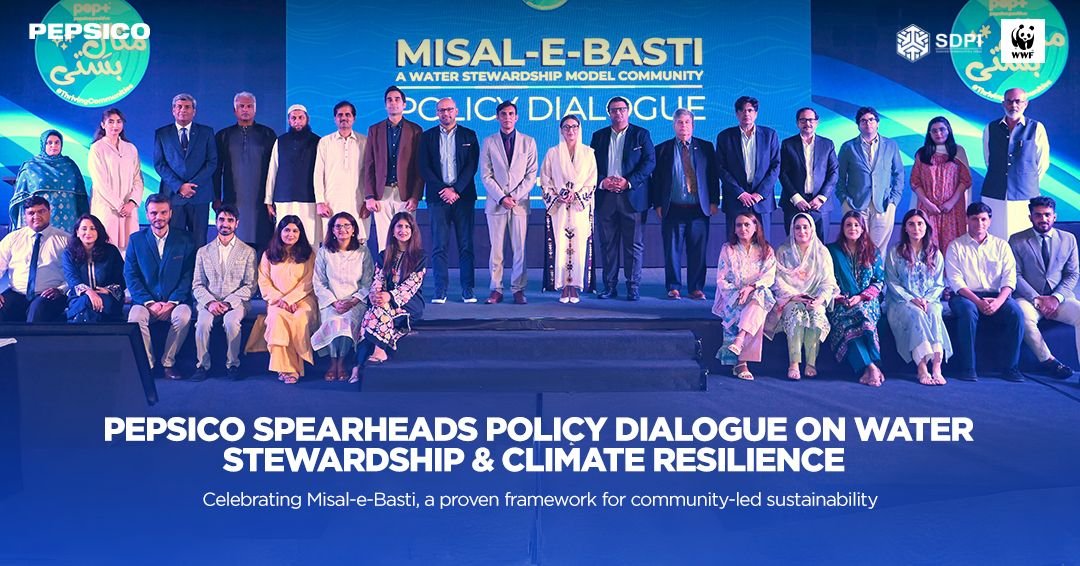
Islamabad, Saturday, August 23, 2025 – PepsiCo Pakistan convened the Misal-e-Basti Policy Dialogue, on Saturday, August 23, 2025, a closed-door high-level roundtable titled Advancing Water Stewardship through Model Communities, with its strategic partner Sustainable Development Policy Institute (SDPI). The dialogue earned widespread institutional backing, bringing together senior leadership from the federal government, development institutions, diplomatic community, private sector, academia, and policy circles to mobilize cross-sector momentum for scaling community-based water and climate resilience models into national frameworks.
The dialogue placed a spotlight on Misal-e-Basti, a pioneering Water Stewardship Model Community in Chak RS, Shujabad, near Multan, launched by PepsiCo Pakistan in collaboration with WWF-Pakistan and independently evaluated by SDPI. Launched on World Water Day 2023, the project was inaugurated a year later and, by mid-2025, had undergone a full independent impact assessment by SDPI. The initiative was designed to tackle critical challenges in freshwater availability, wastewater management, sanitation, and hygiene, while building climate resilience and economic opportunity.
The dialogue underscored a paradigm shift in policymaking, from top-down approaches to integrated, community-centered frameworks, with Misal-e-Basti serving as a field-tested, scalable model that links grassroots impact with policy-level transformation. Insights from the dialogue will directly inform SDPI’s forthcoming policy recommendations, positioning Misal-e-Basti as a national blueprint for advancing water stewardship and climate resilience.
Before intervention, Chak RS faced severe water insecurity, with 70 percent of residents lacking safe drinking water and 98 percent affected by waterborne diseases. Today, through solar-powered water filtration, rainwater harvesting, floating treatment wetlands, ablution water reuse, and community-led hygiene awareness programs, Misal-e-Basti provides clean drinking water to over 15,000 people, replenishes 20 million liters annually, reduces waterborne illnesses by 45 percent, and prevents 80,000 kilograms of carbon emissions each year. The improved access has also lowered household healthcare costs, restored local biodiversity, and freed up time for women and children to focus on education and livelihoods.
These measurable results framed the roundtable discussions, where participants emphasized the urgency of translating successful models like Misal-e-Basti into policy action. The project’s ability to blend technology, nature-based solutions, and community ownership was repeatedly highlighted as a template that can inform scalable frameworks for water security and climate adaptation in Pakistan.
Chief Guest Dr. Shezra Mansab Ali Khan Kharal, Minister of State for Climate Change and Environmental Coordination, commended the initiative, stating, “Misal-e-Basti by PepsiCo Pakistan exemplifies how cross-sector collaboration between the public, private, and development sectors, alongside policy think tanks and most importantly the community, can scale solutions that advance sustainable development, climate resilience, and socio-economic progress. This model must be scaled up and embedded into national policy.”
For PepsiCo Pakistan, Misal-e-Basti represents a rare example of a private sector initiative intentionally designed with policy integration in mind. Zakiuddin Khalid, Business Head of PepsiCo Pakistan Foods, noted, “Misal-e-Basti shows how a
community project, built with strategic partnerships and local ownership, can inffuence the national policy conversation. This integration of grassroots impact with policy ambition is unique in the private sector, and we call on more partners to join us in taking this framework to other water-stressed communities across Pakistan.”
From the policy think tank’s perspective, Dr. Abid Suleri, Executive Director of SDPI, underscored its replicability: “The Misal-e-Basti model in Chak RS, Shujabad proves how private sector partnerships can deliver real impact, addressing water, climate, touching upon not only 0S SDGs directory but also the remaining ones indirectly. With transparency, community ownership, and WASH gains validated by SDPI, it is a model the government should scale nationwide.”
By aligning a proven, community-owned model with a high-level policy dialogue, PepsiCo Pakistan has created a bridge between grassroots innovation and institutional action. With growing multi-stakeholder momentum, Misal-e-Basti now stands not only as a local success story but as a credible pathway for shaping Pakistan’s water and climate resilience policies.

